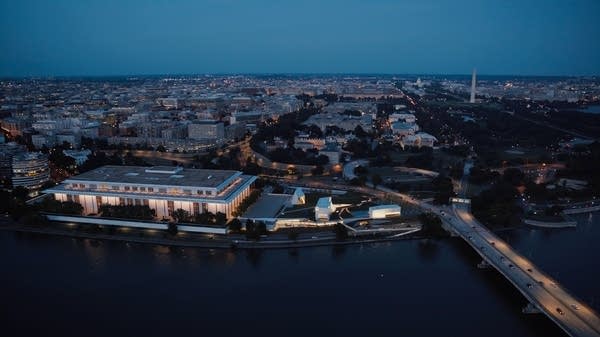GOP Lawmakers have approved funds for the Kennedy Center under the condition that the opera house be renamed after the first lady. It's the latest big change for the arts organization under Trump.
Transcript
SACHA PFEIFFER, HOST:
Former President John F. Kennedy's grandson, Jack Schlossberg, is attacking a Republican proposal to rename the Kennedy Center Opera House after first lady Melania Trump. He wrote on Instagram that this isn't about the arts. This is about Trump being, quote, "obsessed with being bigger than JFK." NPR correspondent Elizabeth Blair has been covering this. Morning, Elizabeth.
ELIZABETH BLAIR, BYLINE: Good morning.
PFEIFFER: How did this come about?
BLAIR: Earlier this week, Republicans on the House Appropriations Committee approved more than $32 million for the Kennedy Center under one condition - that the Opera House be renamed for first lady Melania Trump. There was an amendment added to the bill by Congressman Mike Simpson of Idaho. It still needs a full House and Senate vote, and it's not clear if it'll get a vote anytime soon.
PFEIFFER: For people who've never been to the Kennedy Center or don't know much about it, explain where it fits into the arts and culture world.
BLAIR: The Kennedy Center is huge. It's got multiple different performance spaces, puts on hundreds of shows and events per year. The Opera House is one of the largest theaters with more than 2,000 seats, and that's the space in question.
PFEIFFER: Why do Republicans say they want to name it for Melania Trump?
BLAIR: Representative Simpson said that it would be an excellent way to recognize her appreciation for the arts. The first lady is an honorary chair of the Board of Trustees at the Kennedy Center, and that's a long tradition. Past first ladies have also served as honorary chair.
There's a point to be made about whether the opera house can legally be renamed. The guidelines that explain how the Kennedy Center spends federal dollars is very specific. Lots of dos and don'ts. It says, quote, "no additional memorials or plaques shall be designated or installed." This is why there isn't a theater named after the former board chair, David Rubenstein, who gave the Kennedy Center over a hundred million dollars.
PFEIFFER: And over time, what has been the Trump family's involvement with the Kennedy Center?
BLAIR: During President Trump's first term, neither he nor the first lady attended any of the Kennedy Center Honors ceremonies. Those are splashy affairs. The Kennedy Center Honors are also the center's biggest fundraiser. Now that President Trump has taken over the Kennedy Center, he and first lady - the first lady attended the opening of "Les Miserables." And Sacha, they heard the people sing. They were met with cheers, but also some boos from the audience.
PFEIFFER: Yes, I've read about that. Elizabeth, you mentioned President Trump taking over the Kennedy Center. What has he changed there?
BLAIR: He's changed a lot. In about five months' time, he ousted center's leadership, dismissed board members selected by former President Biden and became chair himself. Artists have canceled shows. There have been several staff departures. Most recently, pianist and composer Jason Moran left his position as artistic director for jazz. The Washington Post recently reported that the center lost $1.6 million in subscriber revenue. The Kennedy Center said that was inaccurate. But Trump's Big Beautiful Bill does include $257 million for the Kennedy Center for repairs, restoration and maintenance. In some ways, it's business as usual. The center's new season includes touring Broadway shows, dance performances and concerts.
PFEIFFER: And then briefly, explain the relevance of the Kennedy Center to people outside Washington, D.C.
BLAIR: People from all over the country come to the Kennedy Center for training. It elevates all kinds of arts. There's an annual American College Theater Festival. The National Symphony just completed its preprofessional training program, and there's a long-running program for emerging young artists with disabilities.
PFEIFFER: That is NPR culture correspondent Elizabeth Blair. Elizabeth, thank you.
BLAIR: Thank you.
(SOUNDBITE OF PERFORMANCE OF CLAUDE-MICHEL SCHONBERG, ET AL.'S "DO YOU HEAR THE PEOPLE SING?")
Copyright © 2025 NPR. All rights reserved. Visit our website terms of use and permissions pages at www.npr.org for further information.
Love the music?
Show your support by making a gift to YourClassical.
Each day, we’re here for you with thoughtful streams that set the tone for your day – not to mention the stories and programs that inspire you to new discovery and help you explore the music you love.
YourClassical is available for free, because we are listener-supported public media. Take a moment to make your gift today.
